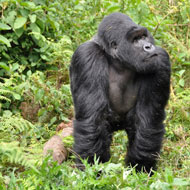Study suggests gorillas form social bonds with distant relations

(findings suggest that human social systems stretch back to the common ancestor of humans and gorillas
Gorillas form social bonds with distant relations in a similar way to humans, new research suggests.
The study led by the University of Cambridge found “social tiers with striking parallels to traditional human societies”.
Their findings suggest that human social systems stretch back to the common ancestor of humans and gorillas, rather than arising from the "social brain" of hominins after diverging from other primates.
In the study, researchers used more than six years of data from two research sites in the Republic of Congo where they documented the social exchanges of hundreds of Western lowland gorillas.
Gorillas live in small family units consisting of a dominant male and several females with offspring, or as solitary male “bachelors”. Lead author Dr Robin Morrison used statistical algorithms to reveal patterns of interaction between family groups and individuals between data sets.
By analysing the frequency and length of “associations”, she found that beyond immediate family there was a tier of regular interaction - an average of 13 gorillas - that is similar to “dispersed extended family” in traditional human societies. For example aunts, cousins and grandparents.
Beyond that, a further tier of association involved an average of 39 gorillas, similar to an “aggregated group” that spends time together without necessarily being closely related.
"An analogy to early human populations might be a tribe or small settlement, like a village," said Morrison.
She also found that where dominant males (silverbacks) were half-siblings, they were more likely to be in the same “tribe”. More than 80 per cent of the close associations identified, however, were between more distantly related-or even apparently unrelated silverbacks.
"Females spend time in multiple groups throughout their lives, making it possible for males not closely related to grow up in the same natal group, similar to step-brothers," said Morrison. "The bonds that form may lead to these associations we see as adults."
The results are published in the journal Proceedings of the Royal Society B.



 The Animal and Plant Health Agency (APHA) has updated its online reporting service for dead wild birds.
The Animal and Plant Health Agency (APHA) has updated its online reporting service for dead wild birds.